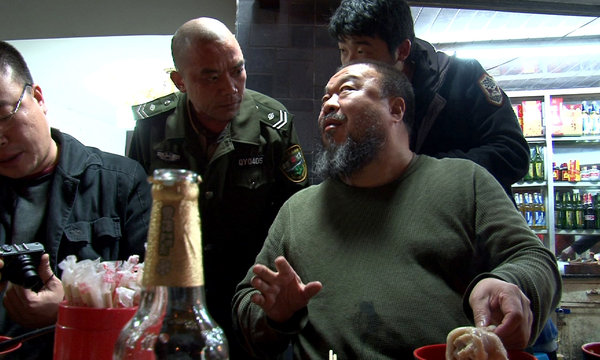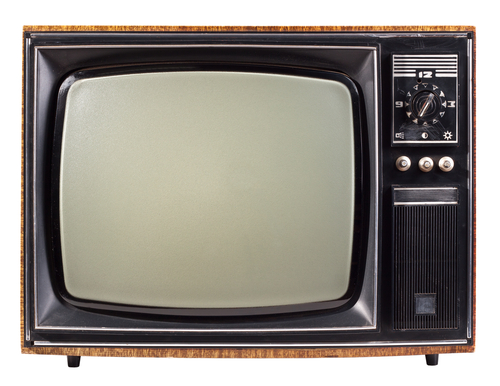In December 2008 a 24-year-old American, Alison Klayman, as a favor to a friend, started videotaping the Chinese artist Ai Weiwei. Her timing was dazzling. In May 2008, right after the catastrophic earthquake in the Sichuan Province, Mr. Ai had begun posting photographs of the disaster on his blog. A few months later he began distancing himself from the National Stadium known as the Bird’s Nest, which had been built in Beijing for the 2008 Summer Olympics and for which he had been a creative consultant. He called the China Olympics effort a “pretend smile” and criticized its heavy security. On Aug. 25, in The Guardian, he wrote that China’s quest for gold medals wasn’t important.
|
Giving a Voice to a Big-Picture Thinker
Posted on: 08/08/12
Ai WeiWei: Never Sorry, on the Chinese Artist
 Ai Weiwei, right, in the new film of his recent life and work. By MANOHLA DARGISPublished: July 26, 2012“What counts,” Mr. Ai wrote, are “the tens of thousands of lives ruined because of poor construction of schools in Sichuan, because of blood sellers in Henan, because of industrial accidents in Guangdong and because of the death penalty. These are the figures that really tell the tale of our era.” Ms. Klayman couldn’t have known that she would soon help to tell that same tale in her galvanizing documentary,“Ai Weiwei: Never Sorry.” In 2008, two years out of college and living in China, Ms. Klayman had been invited to makea short movie pegged to a show of 10,000 photographs Mr. Ai took while living in New York between 1983 and 1993. (A big man, physically and otherwise, who lives and works in a big, big country, Mr. Ai likes to make big art.) Working, for the most part, by herself, she began tagging after Mr. Ai, interviewing him at his home-studio compound on the outskirts of Beijing with the amusing street address “258 Fake” and then following him into streets, galleries, restaurants and police stations. The project evolved, and Ms. Klayman, perhaps inspired by her monumentally minded subject, ended up with hundreds of hours of material. Some of those visuals were used for a 20-minute piece, “Who’s Afraid of Ai Weiwei,” that she made for the PBS show “Frontline” and which was broadcast in March 2011. Narrated by Ms. Klayman, it ends after the government destroyed Mr. Ai’s new studio in Shanghai and her asking him why he’s so fearless. “I’m so fearful,” he counters, squinting at the camera. At the same time, he continues, “If you don’t act, the dangers become stronger.” That same exchange and other moments from the short movie are also in “Ai Weiwei: Never Sorry,” which expands and, without a voice-over, improves on her earlier work, mostly because it contains more background, interviews and recent events, including his fight against accusations of tax evasion. Last Friday a Chinese court ruled against Mr. Ai, who had argued that tax authorities were wrong when they raided his home studio last year and swept him away for three highly publicized months. Ms. Klayman’s documentary doesn’t include this latest development, of course, but it’s nonetheless extraordinarily up to date. The fluidity and convenience of digital moviemaking tools explain some of its freshness, as does Ms. Klayman’s history as a budding documentarian. It’s clear from watching both the feature and its earlier iterations that, while she was learning about Mr. Ai, she was also learning how to tell a visual story. It’s easy to think that hanging around Mr. Ai, a brilliant Conceptual artist and an equally great mass-media interpolater, played a part in her education. An intimate portrait of the artist and a blurrier snapshot of a country in which he lives, creates and fights, the movie is stuffed with smart talking heads, archival material (look for him as a street portraitist in New York) and fly-on-the-wall scenes of Mr. Ai talking, eating and sending out endless Twitter messages. If it seems as if there were fewer scenes of him making art, it’s only because it’s no longer possible to see the divide between it and his life. His actions and words explain why that’s the case. So does his art, as Ms. Klayman reveals, including by going behind the scenes of a 2010 exhibition at the Tate Modern in London called “Sunflower Seeds.” For that installation Mr. Ai and an army of assistants arranged 100 million handmade porcelain sunflower seeds on an enormous gallery floor. The profound resonance, hinged on an axis of sameness and difference, was stark, beautiful, haunting. “Ai Weiwei: Never Sorry” is rated R (Under 17 requires accompanying parent or adult guardian). Some coarse language and a proudly flipped bird. Ai Weiwei: Never Sorry Opens on Friday in New York; Los Angeles; San Francisco; Washington; and Bethesda, Md. Directed by Alison Klayman; director of photography, Ms. Klayman; edited by Jennifer Fineran; music by Ilan Isakov; produced by Ms. Klayman and Adam Schlesinger; released by Sundance Selects. In English and Mandarin, with English subtitles. Running time: 1 hour 31 minutes. COMMENTS
Be the first to post a comment! Post A Comment:

|
.gif)



.jpg)

